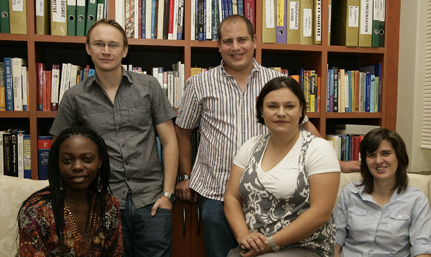|

|
|
Some of the new scholars in the programme are seen here with Prof Jackie du Toit. From the left are: Drs Gladys Kigozi (Centre For Health Systems Research & Development), Brian van Soelen (Physics), Charles Haddad (Zoology and Entomology), Prof Du Toit and Tanya Beelders (Computer Science and Informatics).
Photo: Johan Roux
22 February 2013 |
A second group of 15 young academics is selected to be part of the Vice-Chancellor’s Prestige Scholars Programme (PSP). The first group of 25 scholars joined the programme in 2011 and some of them were placed at partner universities abroad during 2012.
The programme identifies and promotes promising young academics in the university towards becoming full professors with superior research accomplishments.
Prof Jackie du Toit, Academic Co-director of PSP, says: “This highly prestigious cross-disciplinary programme for the next generation of UFS professors in the last two years produced Fulbright scholars; NRF Y1-rated young scholars; NRF Blue Skies and Thuthuka recipients and several National Research Foundation Y2 ratings.
“Scholars on the programme have created partnerships at leading universities in Japan, Europe, the UK and the USA. Within the South African academy, the PSP is a novel approach to the advancement of scholarship and the development of professional scholars. It contributes towards positioning the UFS as an innovator among research universities in this country.”
“This fast-tracking of the next generation of professors involves an intense mentorship programme at the UFS and an international placement with a leading scholar in a top university.”